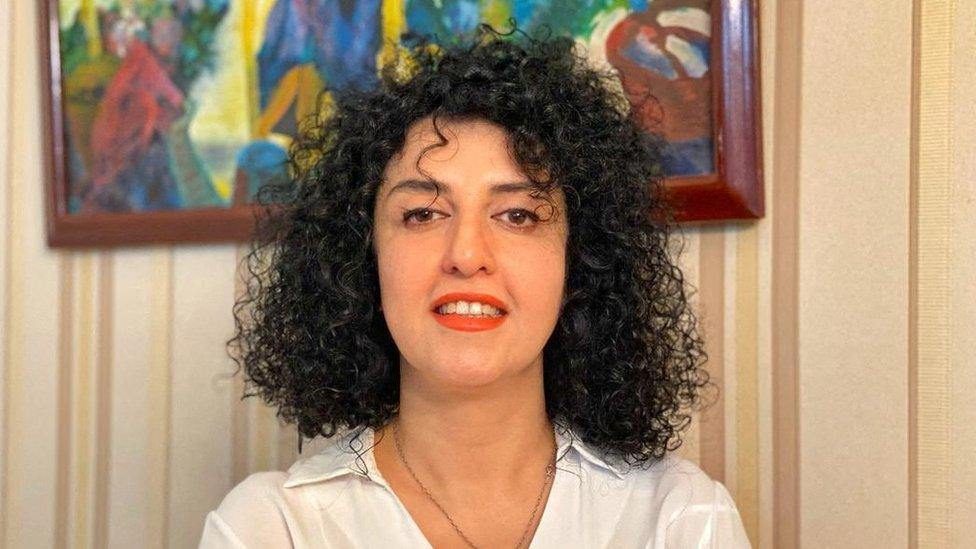Iran prison blocks Nobel Peace Prize winner Narges Mohammadi's hospital care, family says
- Published

Narges Mohammadi, 51, suffers heart and lung conditions
Iranian prison authorities have blocked jailed Nobel Peace Prize winner Narges Mohammadi's hospital care after she refused to wear a hijab, relatives say.
Ms Mohammadi, 51, was refused a transfer from Evin prison for treatment for a heart condition, her family said.
"The prison warden [said] sending her without a headscarf was prohibited," they said in a statement.
Mohammadi was awarded the prize in October "for her fight against the oppression of women in Iran".
The family warned that her life was at risk.
There was no immediate comment from Iranian authorities.
On Monday, a medical team came to the women's wing of Evin to examine Ms Mohammadi and carry out an echocardiogram scan after "the prison even refused to transfer Narges to the infirmary" without a headscarf, the family said on her Instagram account.
They said the scan showed two veins with severe blockages and high lung pressure, with a coronary angiogram and lung scan urgently needed.
"She is willing to risk her life by not wearing the 'forced hijab', even for medical treatment," the family said.
"Two days and nights, a group of women in Evin protested in the prison yard to send Narges Mohammadi to the heart hospital.
"The prison warden announced that, according to the orders of the higher authorities, sending her to the heart hospital without a headscarf was prohibited, and her transfer was cancelled."
Mohammadi is serving multiple sentences in Tehran's Evin prison amounting to about 12 years, according to the Front Line Defenders rights organisation.
Her Nobel prize came in the wake of months-long protests across Iran triggered by the September 2022 death in custody of Mahsa Amini, 22, who had been arrested for allegedly flouting the Islamic republic's strict dress rules for women.
Ms Mohammadi has since announced she would not under any circumstances wear a hijab, which has been obligatory for women in public spaces since shortly after Iran's 1979 Islamic revolution.
In a message expressing gratitude for the prize, read by her daughter and posted on the Nobel website this week, Ms Mohammadi described the compulsory hijab as a "means of control and repression imposed on society".
Earlier this week, she also expressed outrage over what she described as the "murder" of 17-year-old Armita Garawand, who activists say died after being beaten by the Tehran morality police for not wearing a headscarf. Iranian authorities deny she was beaten.
Related topics
- Published6 October 2023
- Published6 October 2023